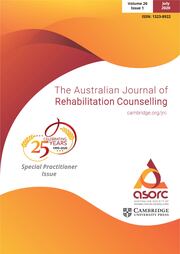Article contents
Interpreting the Evidence on Interventions With Challenging Behaviour: Theoretical, Contextual and Cultural Perspectives from New Zealand
Published online by Cambridge University Press: 15 October 2015
Abstract
Research on managing challenging behaviour in children and young people with disabilities is becoming increasingly complex as a guide to best practice. There continues to be an outpouring of single-case studies conducted in the traditional research methods and conceptual models of applied behaviour analysis. In contrast, there is growing recognition of the importance of context, social systems, and cultural values, not only in understanding the causes of challenging behaviour, but in the design of interventions and the evaluation of rehabilitative treatments. A ‘third wave’ of educative intervention approaches attempts to integrate these two perspectives within concepts of positive behaviour support. We offer practitioners some guidance to the extant empirical literature by bringing together the most promising themes within this rapprochement.
- Type
- Articles
- Information
- The Australian Journal of Rehabilitation Counselling , Volume 14 , Issue 2 , 01 September 2008 , pp. 79 - 93
- Copyright
- Copyright © Cambridge University Press 2008
- 1
- Cited by




